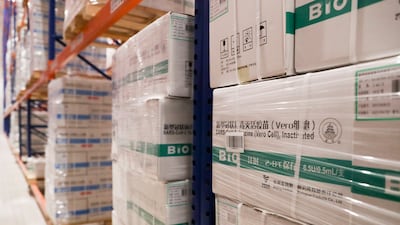Follow the latest updates on the Covid-19 pandemic here
A site in Abu Dhabi's port district is being used as a vital centre to send millions of coronavirus vaccine doses across the globe, especially to the developing world.
The 19,000-square metre, ultra-cold facility can store up to 120 million vaccine vials at a time. Its personnel have already handled 45 million vials, which have gone to 35 countries.
Mostly recently, the Hope Consortium – a group of healthcare and logistics companies that includes Etihad and Abu Dhabi Ports – expanded its fleet of freezers to 53. Plans are now under way to increase its supply handling capacity from six billion vaccine doses a year to 18 billion.
“This is under implementation, not just future thinking,” said Dr Omar Najim, executive office director at the Department of Health in Abu Dhabi.
Abu Dhabi Ports
The National visited the centre at the Khalifa Industrial Zone Abu Dhabi, or Kizad, on Wednesday and took a tour of the ultra-cold chambers where certain vaccines can be kept at temperatures as low as -80°C.
Workers and visitors need to wear heavy jackets to endure spending any more than five minutes inside the chambers.
The centre's expanded capacity, which is expected by the end of this year, is important to provide a safe exit for the vaccines, which are in increasing demand, especially in the developing world.
The ability to store shots at ultra-cold temperatures is crucial for vaccines such as Pfizer-BioNTech's.
Having a logistics centre that is capable of handling a vaccine received at any time saves "countries and communities the challenge of building their own supply chains”, said Robert Sutton, head of logistics at Abu Dhabi Ports.
“The model allows it to store large quantities of vaccines at its advanced cold and ultra-cold storage hub in Abu Dhabi, at temperatures ranging from +8°C to -80°C and align its deliveries with the ability of recipient countries and communities to absorb these supplies safely.”
The site, which is operated by Abu Dhabi Ports, has been sending vaccines locally, and to other countries in Europe, Asia and Africa.
“At any point in time we have between 5 and 50 per cent occupancy,” Mr Sutton said.
“The reason it is so low is because the vaccine supply is lower than the demand, but with time they will balance the supply and there will be a greater need for storage.”
The amount of doses received and sent varies from day to day. The centre currently sends between 1 million and 1.5 million doses a day to local vaccination centres.
“And international shipments vary from 10,000 to 100,000 to 1 million a day; no day is like the next,” Mr Sutton said.
“But what we can say is that we are able to process the vaccines now on a daily basis, and Etihad, our airline partner, is not very far from here.”
The port centre was initially used in early 2020 for storage to support the government’s food reserve programme.
“But then Covid came and we quickly switched from food to health care,” Mr Sutton said.
The Hope Consortium was cofounded by the Department of Health, Abu Dhabi Ports, Etihad Cargo, Rafed, Skycell and Maqta Gateway.












